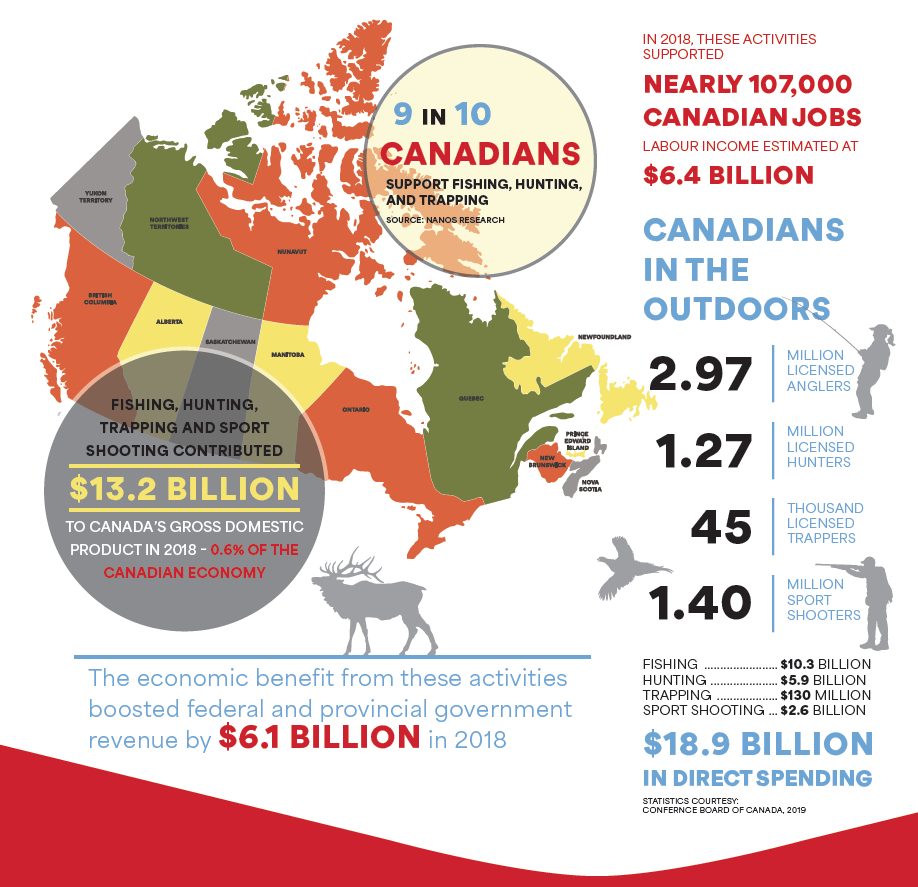We fish. We hunt. We trap. We vote.
The NFHC is a coalition of twelve organizations representing 375,000 anglers and hunters across Canada. On behalf of our members and all conservationists in Canada, the NFHC requests meaningful commitments to these five priorities from the parties seeking to form the next federal government.
A Federal Election will take place April 28
B.C. Wildlife Federation clubs and members have a rare opportunity to ensure that our concerns are heard by candidates for public office. It is essential that every one of us engage with candidates from all federal parties to ensure that Canada’s hunters, anglers, and outdoors enthusiasts are heard, that our demands are incorporated into party platforms, and enacted when the next government is formed.
As a non-partisan charitable organization, the BCWF cannot endorse parties or candidates, but we urge you to vote for candidates who respond positively to our top priorities, detailed below.
NFHC and BCWF set priorities for the 2025 Federal Election
The National Fishing and Hunting Collaborative (NFHC) is a coalition of 12 organizations representing 375,000 anglers and hunters across Canada, including every member of the B.C. Wildlife Federation.
Fishing, hunting, trapping and sport shooting are the passion of millions of men, women, youths and new Canadians. These activities result in $18.9 billion in direct spending and contributed $13.2 billion to Canada’s gross domestic product. These activities continue to support nearly 107,000 Canadian jobs, labor income estimated at $6.4 billion and boosted federal and provincial government revenues by $6.1 billion.
The Collaborative has set five priority areas for the 2025 Federal Election and the next federal government.
Outdoor Heritage and Conservation
Canada is home to three million anglers, more one million hunters and 2.4 million licensed firearms owners. We are asking candidates in the federal election to commit to a national strategy to promote outdoor recreation and conservation.
Directing a meaningful portion of the GST charged on hunting and fishing gear would ensure our heritage is protected and habitat for wildlife is protected.
Chronic Wasting Disease
When chronic wasting disease spreads unchecked, it can affect up to 85 per cent of the deer in a herd. CWD is 100 per cent fatal in deer, elk, and moose.
The federal government must commit to an immediate prohibition of the movement of these species across provincial and territorial boundaries.
We need to phase out commercial farming of these species to reduce the risk of massive transmission events that could spread the disease even faster.
Public Access to Public Land
Canada intends to conserve 30 per cent of our land and water area by 2030. We are concerned that in the process Canadians could lose access to public lands and wild places.
The federal government must commit to legislation preserving public access to public resources and places for all Canadians who consider hiking, camping, hunting and fishing an important part of their culture and heritage.
The government must make decisions about harvesting fish and wildlife based on science, not optics, to ensure their continued abundance.
Invasive Species
Invasive mussels can clog and foul municipal water and hydroelectric equipment costing us millions of dollars? Their sharp shells can also make beaches unusable and when they die in the millions the stench is unbearable. Parasites and invasive fish species are also a threat to Canada’s native species, especially salmonids.
The federal government must commit to permanent, sufficient funding for education, early detection, and rapid response to invasive threats.
Firearms Regulation
Canada is home to 2.4 million licensed firearms owners, with a safety record that is the envy of the world.
Licensed owners are less likely to commit crimes with firearms than other Canadians and millions of Canadians participate in hunting and shooting sports, where we excel at the highest levels.
The federal government must commit to evidence-based firearms regulation.
It makes no sense to reduce sentences for crimes committed with guns while placing unnecessary restrictions on licensed owners.
Our elected leaders should focus their attention on smugglers, organized crime and gangs – the people who actually commit crimes with firearms.
Pacific Fisheries
In addition to the NFHC’s Election Priorities, the B.C. Wildlife Federation has concerns about Pacific fisheries management. Fisheries and Oceans Canada (DFO) has a long history of conflicts, failure to conserve fish, failure to support the public fishery, and science is often usurped by politics. At the very least, the next federal government must reorganize DFO to focus on the following:
- Prioritize conservation of wild fish and properly fund salmon habitat restoration. That means topping up the Watershed Security Fund with $600 million, accelerating Species at Risk assessments, and getting ocean-based salmon farms out of our waters.
- Ensure that Canadians have access to public fisheries. That means using good data and science-based decision making. Restricting recreational fisheries while ignoring an exploding pinniped population that consumes tens of millions of salmon a month is nonsensical. Eventually, we have to address the real problem.
- DFO scientists must be shielded from political interference. Scientific reports are routinely altered to suit a political narrative and our wild fisheries are paying a steep price.
Watch our Federal Election Videos
The B.C. Wildlife Federation is working on a series of election videos that highlight the issues and allow you to easily share our messaging with your friends and followers. Watch our video series below and help spread the word!
What Can You Do?
We urge you to meet with every candidate, regardless of party, to make clear our demands. Talk to the candidates and ask questions. Use our cheat sheet below to guide your conversations. We hope to see our priorities reflected in party platforms and put into action when the next government is formed.


